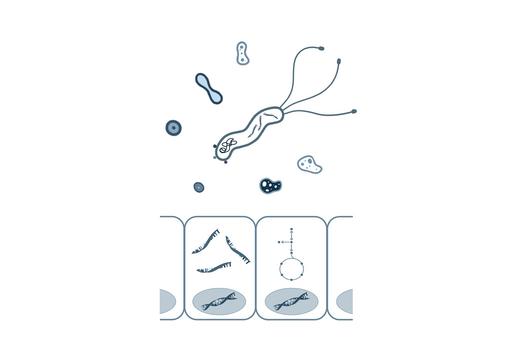
Kaisa Thorell group
Short description
The bacterium Helicobacter pylori is an important risk factor for gastric cancer. We study bacterial genomics and microbial diversity focusing on factors that may affect the host-microbe interaction in gastric carcinogenesis.
Helicobacter pylori colonizes the human stomach and can cause ulcers or gastric cancer, the fourth cause of cancer death worldwide, killing almost one million people each year. However, H. pylori infection is most often asymptomatic and only a small fraction of infected individuals will develop disease from the infection. Indiscriminate eradication of H. pylori is not feasible due to the very high number of people infected, a high reinfection rate, and rapidly escalating resistance to antibiotics. Therefore, markers for identification and selective treatment of high-risk infections are urgently needed.
The genomic variability of H. pylori is very high, both in terms of mutation and recombination frequency, and in gene repertoire. Also, it has a pronounced geographic population structure resembling that of human migrations. Despite this known variability, the prevailing approach is to look only at one time point, one biopsy and one bacterial isolate per patient. The result is that our knowledge of the within-host diversity of H. pylori and the gastric microbiota is very limited, which leads to major uncertainties in attempts to link bacterial features to disease risk. In other bacterial infections and for other parts of the human microbiome, this has been better explored, and extensive heterogeneity and niche-specific evolution have been observed. Another weakness of most genomic studies is the focus on the core genome, i.e. genes present in all genomes analyzed. This ignores around 1/3 of the genes in each genome, for example many of the main genes involved in bacterial virulence.
In a dataset of almost 7000 H. pylori genomes, out of which approximately 2000 have been sequenced by us in Gothenburg, we have recently found a new ecospecies of H. pylori in populations of high gastric cancer risk. This ecospecies has genomic signatures related to those of Helicobacter species from carnivorous animals, suggesting adaptation to a high meat diet. However, the functional impacts of these genetic differences, and their effect on risk for developing gastric disease are yet unknown.
The group brings together expertise in experimental microbiology, bacterial comparative genomics, and bioinformatics. We also leverage on large national and international collaborations, as well as access to unique genome datasets, bacterial isolates, and gastrointestinal biopsy material. Our research aims to increase the understanding of factors affecting bacterial transmission, persistence, and virulence, knowledge that can be used for identifying individuals at high risk for severe disease outcomes.



